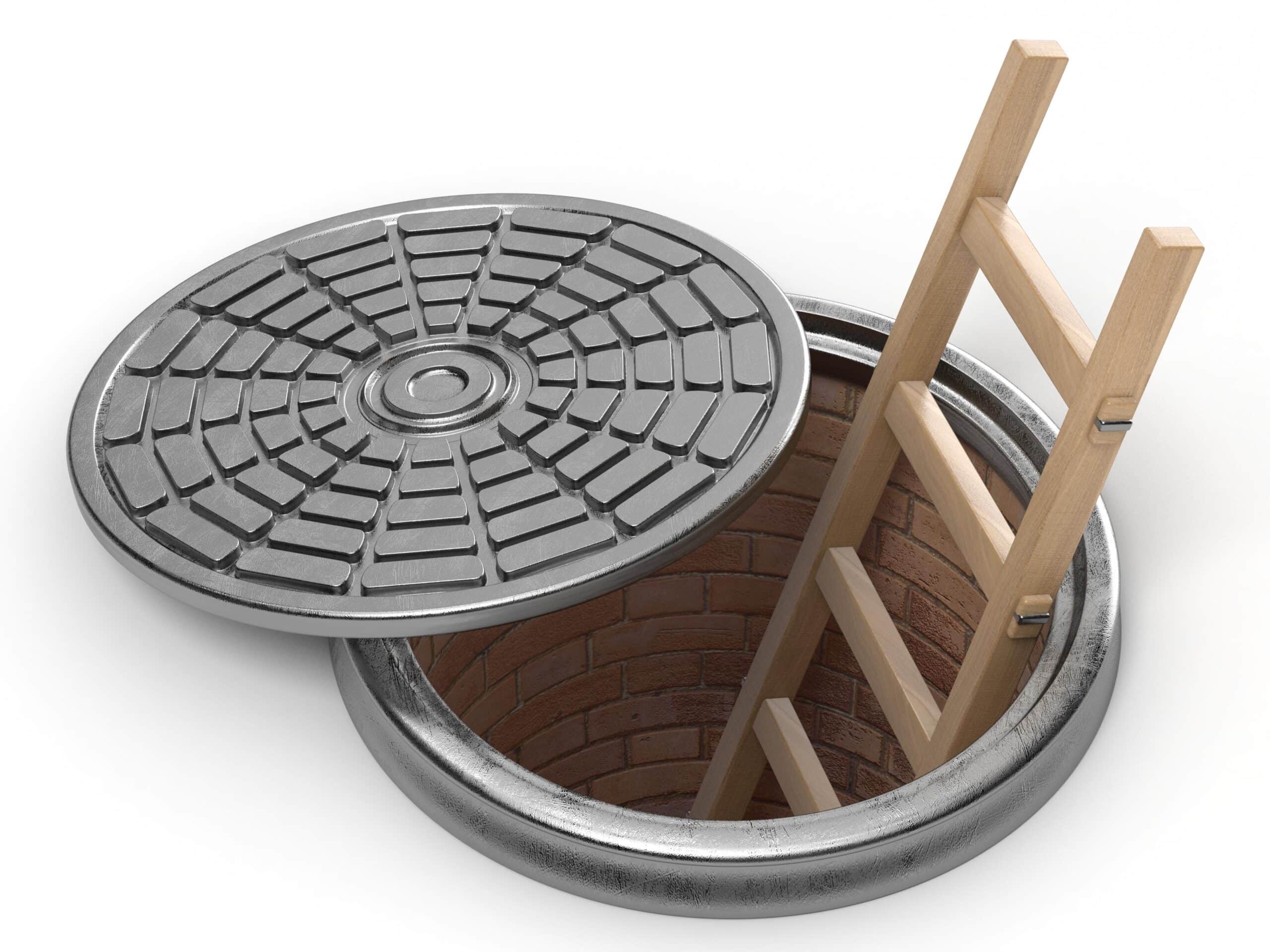Before I jump to the subject at hand, I’d like to tell you a story from my childhood. Its relevance will become apparent, hopefully, by the end.
I was ten and walking along the road with my siblings – who were 12 and soon-to-be 13. We were in a foreign city, and my parents were lingering over their lunch while we made our way through the streets back to our hotel. We were navigating through a bit of a construction area. I set my foot on a wooden plank, and lo and behold: there was a concrete manhole directly beneath it. I dropped into it with a crash. It was a pretty rough fall, and my whole body was wedged in the tight space. My head smacked the edge, and my knees hit the opposite side, and I was stuck in a cannon-ball figuration.
I was crying. The pain in my head and my knees felt unbearable. I was stuck, in pain, and I couldn’t move or do anything to get out of the situation. My siblings tried to help. They tried pulling me up, but it didn’t work. A crowd of strangers gathered. They were no doubt both sympathetic and amused by the sight of this red-head girl stuck in a manhole. I looked out and up at the spectators with a teary-eyed dazed look.
My siblings knew they were in over their heads while I was in on my head. They quickly ran back to where my parents were enjoying their leisurely lunch and to call in reinforcements to release me free from my predicament. I cannot remember all that happened, but I made it out of the hole with the help of my parents, with slight bruising and as much injury to my ego as to my head and knees.
I would like to think that the middle school moods that followed this traumatic episode in my life were the result of the injury to my head, but now that I am the parent of a middle-schooler and have traversed these waters a few times, I realize middle school is a time for moods – for displacement, peaks and valleys, topsy-turvy emotions and family distress. Middle schoolers more and more look like adults, but inside that mature outer look, run rivers of deep emotion, immature impulsivity, turmoil, and resistance to change. I had my own season of middle school moods, and now I see these emerge in youngsters in my own home, and it reminds me very much of the story I told above.
You might be going through a regular day – homework, meals, music lessons, sports events, outdoor work, indoor work, social events – when suddenly, you find yourself in a construction zone. ‘Fair enough,’ you might muse, ‘we will just walk on through!’ Then suddenly, a shoddy plank goes out from underneath you, and you find yourself stuck in one of those pitfalls with no way out, except for calling on outside aid to borrow their strength to save you. The metaphor applies both to parents and kids – help is often needed, and super-human strength is necessary to pull us out of these difficult times.
Scene 1
The 8-year-old who struggles with perfectionism couldn’t get her piano piece just right. She burst into tears with passionate emotion and said, ‘I just want to quit! Can I quit!?’ Normally, my answer would be a firm ‘no.’ But my motherly intuition told me this was headed into uncharted territory. I indulged the request.
‘Sure!’ I said, waiting expectantly to see how this would play out.
‘But then my teacher will be upset! I don’t want to upset her, so I can’t quit!’ she wailed.
‘Yes, you’re right about that. So maybe you just need some help to get it right?’ I offered.
‘Okay,’ she whimpered, still petulant and frustrated. She was having a major meltdown at the piano. I came up next to her, rubbed her shoulders, gently hugged her and said, ‘I’ll sit here and help you if you want.’
I knew that her moment was passing, and she didn’t need correction, rebuke, a lecture, or even necessarily my expertise on the piano. She required my presence, acceptance, care, and patience. I sat next to her and coached her through the next 10 minutes or so – suggesting a break when it became too taxing, giving her hugs when she felt defeated, offering her support in whatever way she needed it.
To some, this might sound like I was coddling her lack of emotional self-control. There are times I am firm and issue parental commands for emotional outbursts – particularly when I sense the source is discontent, complaining, or from a spoiled or demanding nature. There are certainly times as a parent that I am less than soft – but at this moment, I instinctively knew firmness would be counter-productive to her progress both in piano and in life. I trust you have that kind of instinct too.
Scene 2
About 10 minutes after the piano episode wound down, my middle schooler entered the room and was also having a meltdown. He was angry and upset about something he chose not to share with me. As luck would have it, I was the nearest target.
He said things to me that were rude and unkind, and I told him so. He was disrespectful and frankly, wrong, in his behavior and words. Even though I called him out on the aspects of his behavior that were less than desirable, I also moved towards him and gently squeezed his arm and said, ‘I understand you’re angry. What can I do to help you?’
He was still a bit hostile at this point, but his aggression had lessened. Right at this moment, my husband entered and witnessed my son’s behavior and was really upset.
‘You can’t let him speak to you that way!’ he told me firmly.
My husband was right, but at that moment, my middle schooler couldn’t hear or receive any instruction as he was too ‘hot’ – too escalated and out-of-sorts to be open for a lesson. I told my middle-schooler directly that he was rude and disrespectful but that I loved him and wanted to help him calm down. Even in that moment, he heard and understood he was dealing with his emotions in inappropriate ways, but he didn’t know how to handle it himself: he was stuck in the manhole and needed outside help to pull him out.
Now, if I had berated my son for the poor stewardship of his words and emotions, I certainly would be pushing him further into the hole and not helping him out of it.
When my husband and I processed this together later, I was able to paint the big picture. I told him about the younger child’s meltdown at the piano. I said, ‘She was expressing her frustration and anger towards herself and through tears. The older boy was expressing the very same thing – frustration, anger, and hopelessness – through outbursts of anger and disrespect.’
I had an aha moment where I saw that both children were struggling with the same thing, but that it was easier to draw near to an 8-year-old weeping at a piano than a 13-year-old lashing out at me in the kitchen. I had the presence of mind (thank you, Lord!) to respond to both of them with what they needed in the moment: grace, kindness, mercy, and patience. Both of them came through their meltdowns, and both received further instruction when they were cooled down.
When our children are younger, we expect them to act immaturely – as parents, we realize they will fail to manage themselves well, and we allow for their imperfections and emotional ups and downs.
It is easy to forget that our middle school children are still children: that they often regress into toddler-like tantrums and display less maturity than their 10-year-old selves. Middle schoolers are dealing with an onslaught of changes – greater school and academic challenges, bodily changes (hellooo hormones!), changing family dynamics when they are called up to shoulder more responsibility, new social challenges, and the desire for friendship and a place to belong. All of these factors are normal and good, but one can understand that these young ones would, at times, become stuck in a manhole and need assistance to get out.
I mentioned before that I had my own mood swings during my middle school years. I was volatile, angry, depressed, teary, and withdrawn. My moods threw me off-kilter, but I didn’t know that this was a normal occurrence for a middle schooler. Those around me reacted to my moods because they probably didn’t know what else to do.
Sometimes my parents prayed over me endlessly pleading with God for me to conform to whatever ideals He and they had for me. Not a bad prayer for parents to pray, but not really helpful for the middle schooler who is in the swing of it. My moods were met with understandable frustration and necessary rebuke, but not often with gentle cushioning or support. I decided to try a different path with those under my care: to act as a cheerleader and support staff rather than as a policeman. We all have moods, and in my experience, being instructed to calm down has never helped me calm down. In fact, it has often spurred quite the opposite reaction.
I don’t have a formula for how to deal with middle school moods. The best advice I have is to be tuned in to these children’s inner needs: is their anger truly about the issue at hand, or is it an expression of need and a cry for help?
Too often, we react and respond to only what we see on the surface: look deeper; you might find potential points of connection if you wait around and push through the discomfort of being yelled at. If I had reacted harshly to my middle schooler, I would’ve put a barrier between us and would have had to work to remove it to bring about healing in our relationship. Of course, his rudeness put up a natural barrier in our relationship, but if only one of us constructs barriers, there is less removal work to do in the end. I try to remind myself to be the adult in the situation and to act like one, even when I’m irritated by the poor behavior and outbursts of my middle schooler.
Scene 3
Being an adult reqires being able to put others’ needs before your own. This skill came to the test one evening after a particularly brutal exchange with my middle schooler. I instinctively knew I needed to move towards him even though he had hurt me deeply: it was time for me to become what he needed and to nurse my wounds in private later.
It is at these times that we may be saving lives, literally. When our children are hurting and in despair, and we can rise to meet their needs. In these volatile years, children need greater support and patience from their parents than ever before.
Emotional abandonment is brutal. It yields lifelong scars. We can easily inflict harm on distraught middle schoolers simply because our parenting ire has been raised, and we feel justified in lowering the gavel on them for their failures. I recommend avoiding doing this at all costs: you may save their lives by moving towards them in kindness rather than against them in judgment.
So how did I soothe my child’s frustration? I crawled into his bed with him and scratched his back. I waited. He softened, and I pushed him to tell me about the things that caused such anger.
These are productive moments – if you can wait long enough, demonstrate emotional safety and a willingness to hear their hearts. After a time, I said, ‘I’m going to pray for what you need. He had himself given up on praying for his needs. I prayed aloud for the things that burdened his heart, and then I went to bed.
The next day, God answered our prayer. I was able to point out to my son that we prayed, and God answered. If I did not labor through the darkness with my son, I would have missed the opportunity to point him to the One who invites us to bring all our requests before Him. I would have missed a chance to show my son that God cares about him deeply and knows him personally.
So to answer the question: How does one deal with middle school moods? With prayer, patience, and total dependence on the wisdom and grace of God in each moment.
I invite you to do likewise.
{{cta(‘1723d28d-0293-490b-9801-ab9971837bda’,’justifycenter’)}}
{{cta(‘c0d03a5c-deb4-45a3-af3b-43924a7b1b87′,’justifycenter’)}}



